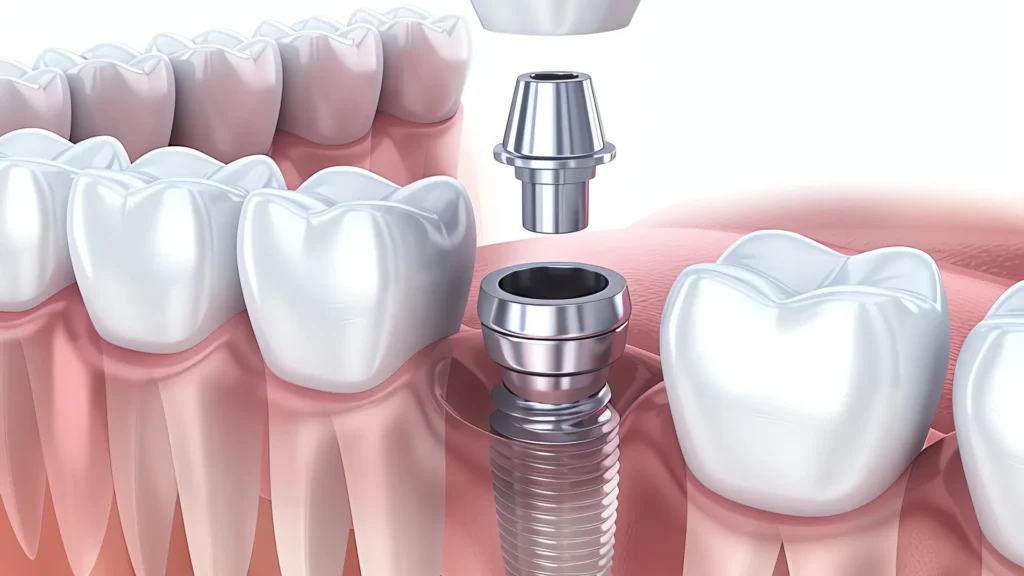Dental implants are one of the most advanced and reliable solutions for replacing missing teeth. With their natural look and feel, they have become a popular choice for restoring smiles and improving oral health. But one question that often arises is: How long do dental implants really last? In this blog, we’ll explore the factors that affect the longevity of dental implants and what you can do to ensure their durability over time.
What Are Dental Implants?
Dental implants are titanium posts that are surgically placed into the jawbone, acting as artificial roots for replacement teeth. They are designed to support dental prostheses like crowns, bridges, or dentures, providing a permanent and sturdy solution for missing teeth. Once the implant is integrated into the jawbone, it can last for many years, functioning just like a natural tooth.

Average Lifespan of Dental Implants
On average, dental implants can last anywhere from 25 to 30 years and even longer with proper care. Many patients enjoy their implants for a lifetime without any issues. The implant’s lifespan depends on several factors, including the patient’s oral hygiene, lifestyle habits, and overall health.
Factors Affecting the Longevity of Dental Implants
1. Oral Hygiene
Just like natural teeth, dental implants require good oral hygiene practices to stay healthy. Regular brushing and flossing, along with routine dental check-ups, are essential to prevent gum disease and peri-implantitis (inflammation around the implant), which can compromise the stability of the implant.
2. Bone Health
The success of a dental implant largely depends on the health of the jawbone. Sufficient bone density is required to support the implant. Over time, if bone loss occurs due to conditions like osteoporosis or periodontal disease, it can affect the implant’s stability. In such cases, bone grafting procedures might be needed before implant placement.
3. Lifestyle Habits
Certain lifestyle habits can impact the longevity of dental implants. Smoking, for example, significantly increases the risk of implant failure due to its effect on blood flow and healing. Similarly, excessive alcohol consumption and poor dietary habits can weaken the immune system and impair the healing process.
4. Implant Material and Quality
The quality of the implant material and the skill of the dentist play crucial roles in the success of the procedure. High-quality titanium implants, placed by an experienced dental surgeon, have a higher chance of lasting longer. It’s important to choose a reputable clinic with a track record of successful implant placements.
5. Patient’s Health Condition
Underlying health conditions like diabetes, autoimmune diseases, and certain medications can affect the healing process and the integration of the implant with the bone. It’s essential to discuss your medical history with your dentist to determine if dental implants are the right choice for you.
How to Care for Your Dental Implants
To ensure the longevity of your dental implants, it’s important to follow a proper care routine:
- Maintain Good Oral Hygiene: Brush at least twice a day with a soft-bristled toothbrush and use an antibacterial mouthwash to reduce the risk of infection.
- Floss Regularly: Use dental floss or interdental brushes to clean between the implants and natural teeth. This helps remove food particles and plaque that can lead to gum disease.
- Visit Your Dentist Regularly: Regular dental check-ups and professional cleanings are essential to monitor the health of your implants and surrounding gums.
- Avoid Hard Foods: Chewing on hard objects like ice or hard candies can damage the implant crown. Stick to a diet that avoids putting unnecessary pressure on your implants.
- Quit Smoking: If you smoke, quitting can significantly improve the health of your gums and the success rate of your implants.
Can Dental Implants Fail?
While dental implants have a high success rate, failure can occur in rare cases. The failure rate is estimated to be between 5-10%, which is relatively low compared to other dental procedures. Some common reasons for implant failure include:
- Infection (Peri-Implantitis): Infection around the implant site can lead to bone loss and implant failure if not treated promptly.
- Insufficient Bone Support: If there isn’t enough bone to support the implant, it may not integrate properly, leading to loosening or failure.
- Poor Oral Hygiene: Neglecting oral hygiene can result in gum disease, which can compromise the implant’s stability.
- Bruxism (Teeth Grinding): Chronic teeth grinding can exert excessive pressure on the implants, causing them to become loose or damaged.
Are Dental Implants Worth the Investment?
Considering their durability, natural appearance, and ability to restore function, dental implants are a worthwhile investment for many patients. While the initial cost may be higher compared to other tooth replacement options, their longevity makes them a cost-effective solution in the long run.
Final Thoughts
Dental implants are a highly effective and durable solution for missing teeth, offering a long-lasting option that can improve your quality of life. By taking good care of your implants and maintaining a healthy lifestyle, you can enjoy the benefits of a beautiful and functional smile for many years to come.
If you’re considering dental implants, and in search of a trusted dental implantologist in the Kothrud Pune area, we invite you to visit Odontoville Dental Clinic & Implant Center. Our team of experienced dentists with our Chief Doctor Dr. Shubhangi Dole who is specialized in Prosthodontics & Dental Implants are ready to provide personalized care in a comfortable environment.
Contact us today to schedule your appointment and take the first step toward a healthier, happier smile!





